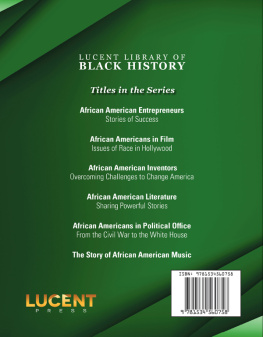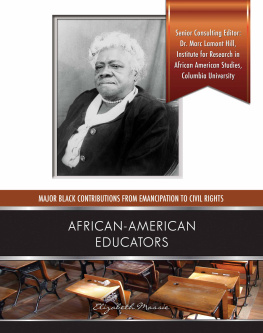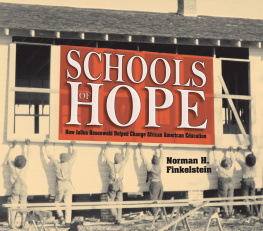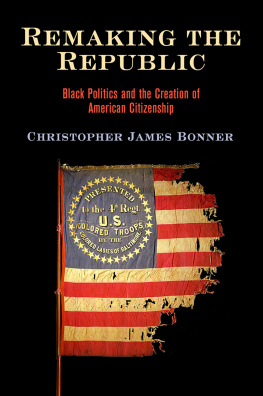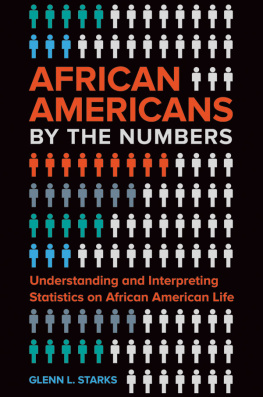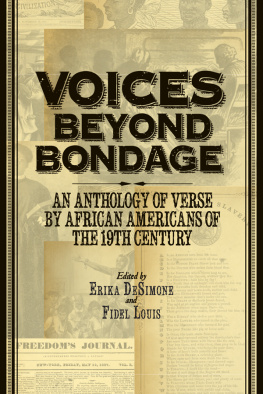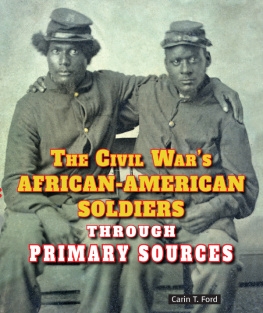From Cotton Field to Schoolhouse
2009
THE UNIVERSITY OF NORTH CAROLINA PRESS
ALL RIGHTS RESERVED
Designed by Courtney Leigh Baker and set in Dante and
Archive Autograph Script by Tseng Information Systems, Inc.
Manufactured in the United States of America
The paper in this book meets the guidelines for permanence
and durability of the Committee on Production Guidelines
for Book Longevity of the Council on Library Resources.
The University of North Carolina Press has been a
member of the Green Press Initiative since 2003.
Library of Congress Cataloging-in-Publication Data Span,
Christopher M.
From cotton field to schoolhouse : African American
education in Mississippi, 18621875 / Christopher M. Span. 1st ed.
p. cm.
Includes bibliographical references and index.
ISBN 978-0-8078-3290-5 (cloth : alk. paper)
1. African AmericansEducationMississippi
History19th century. 2. FreedmenMississippiHistory.
3. EducationMississippiHistory19th century.
4. Education and state MississippiHistory19th century.
5. MississippiRace relationsHistory19th century.
6. MississippiPolitics and government18651950. I. Title.
LC2802.M7S65 2009
371.82996073076209034DC22
2008052517
13 12 11 10 09 5 4 3 2 1
TO MY PARENTS
Samuel Spann and Judith Jenkins
Slaves yesterday, to-day free: What shall they be to-morrow?
WILLIAM WELLS BROWN,
The Negro in the American Rebellion (1867)
CONTENTS
APPENDIX. KNOWN AFRICAN AMERICAN
POLITICIANS AND LEGISLATORS IN MISSISSIPPI DURING
RECONSTRUCTION, 18701875
MAP AND TABLES
MAP
Mississippi, 1870
TABLES
1 Schools Reported by the Freedmen's Bureau as Sustained Wholly or in Part by Freedpeople, 18671870
2 Schools for Freedpeople Taught by Northerners, Early 1865
3 Schools Consolidated by the Freedmen's Bureau for Freedpeople, January 1867May 1870
4 School Population, Enrollment, and Average Attendance of Educable Children, 18701871
5 School Population, Enrollment, and Average Attendance of Black and White Youth in Fifteen Majority-Black Counties, 18701871
6 Enrollment, Number of Public Schools, and Number of Enrolled Pupils per School in Fifteen Majority-Black Counties, 18701871
7 School Population, Enrollment Percentage, and Average Attendance Percentage of Black and White Youth in Fifteen Majority-Black Counties, 18701871
8 Number of Public Schools for Enrolled Black and White Youth in Fifteen Majority-Black Counties, by Type, 18701871
9 School Population, Enrollment, and Average Attendance of Black and White Youth in Fifteen Majority-White Counties, 18701871
10 School Population, Enrollment Percentage, and Average Attendance Percentage of Black and White Youth in Fifteen Majority-White Counties, 18701871
11 Enrollment, Number of Public Schools, and Number of Enrolled Pupils per School in Fifteen Majority-White Counties, 18701871
12 Number of Public and Private Schools for Black and White Educable Youth in the Black and White Counties Analyzed, 18701871
13 Number of Public Schools for Enrolled Black and White Youth in Fifteen Majority-White Counties, by Type, 18701871
14 School Population, Enrollment, and Average Attendance of Educable Children, 18701871 and 18761877
15 Enrollment, Number of Schools, and Number of Enrolled Pupils per School in Fifteen Majority-Black Counties, 18761877
16 Enrollment, Number of Schools, and Number of Enrolled Pupils per School in Fifteen Majority-White Counties, 18761877
ACKNOWLEDGMENTS
I wish to extend my gratitude to everyone who assisted and encouraged me as I completed this book project. I particularly want to acknowledge the people who read all or parts of my book and offered me invaluable suggestions that improved its content. My gratitude extends first and foremost to my colleagues at the University of Illinois: Vernon O. Burton, Sundiata Cha Jua, Ralph Page, Larry Parker, David R. Roediger, William T. Trent, and particularly my fellow historians of education, James D. Anderson and Yoon K. Pak, whose conversations, jokes, and continual support make work in the academy a blessing and not a curse. My appreciation also extends to my colleagues and role models in the field: Ronald E. Butchart, Dionne Danns, V. P. Franklin, Linda M. Perkins, Vanessa Siddle Walker, Fanon Che Wilkens, and Jason R. Young, who have offered their time, eyes, energies, and wisdom to ensure I provided the best narrative possible.
In addition, I would like to acknowledge the staff at the Mississippi Department of History and Archives in Jackson for their commitment to excellence, their patience with my many queries, and their graciousness in making my many research trips to Jackson as painless as possible. Special thanks should be given to the staff at the University of Illinois Interlibrary Loan Department for their patience and efficiency in addressing my countless requests over the years. I want to thank my college and department for continually encouraging and supporting me from my doctoral days to now. Similar gratitude goes to the staff at the University of North Carolina Press for all their assistance. I want to thank the Center for Democracy in a Multiracial Society at the University of Illinois for the faculty fellowship they awarded me. It gave me the uninterrupted time needed to research and revise this book. Last, I want to acknowledge two more mentors, Dean Michael Jeffries and Dr. Priscilla Fortier, for every ounce of support and every memory they have given me throughout my career. To all others, who have gone unintentionally unnoticed, I humbly say thank you.
I want to conclude these acknowledgments by relating a conversation I had with my son and offering a few additional dedications. Lollipops. One day while I was working on the edits of this book, my almost-three-year-old son, Langston, asked me what I was doing. I told him that I was writing a book and he inquisitively asked, Is it about lollipops? I said no, it is about the first schooling opportunities of a people a long time ago, and he paused, look at my computer, then looked back at me, and said, You should write a book about lollipops. His smile and comments instantly reminded me of why I was working so hard to write and tell this story, and while it is not about lollipops, I hope my sonone daywill come to understand why this story is so important. In many ways this book is an introduction for him to the history of his people. All of my fathers family and a significant majority of my wifes family have roots in Mississippi. Retelling the educational experiences of African Americans who emerged from slavery in Mississippi, in many ways, is the chronicling to my son of the lived experiences of his ancestors and what they did to ensure that the next generation of black men and women in the family would have a life better than they had themselves.
I could not have written this history without their stories, their hopes, their spirit, and their support. So this work is dedicated to so many people. It is dedicated to my late mother and father, Judith Jenkins and Samuel Spann, my grandparents, aunts and uncles, brothers and sisters, in-laws, nieces, nephews, and cousins. It is dedicated to my friends, especially Jason Weathington, Felton (Kenny) Maxie, Ronald Wiley Jr., Boyd Reynolds, and Jason Young, for all their encouragement and ability to keep me humble. It is dedicated to my mentors, James D. Anderson and the late Paul C. Violas, for giving me the confidence, wherewithal, and skills to continue their legacy. It is dedicated to my doctoral studentsChamara Kwakye, Jon Hale, Tamara Hoff, Olanipekun Laosebikan, Paul Mathewson, Ishwanzya Rivers, David Roof, Dwania Turner, Duronne Walker, and Kim Walkerfor their patience as I completed this project. It is dedicated to my ancestorsMr. Teet and Miss Holly, Mr. Victor, Miss Emma, Great-Grandma Mattie, Great-Uncle Herman and Great-Aunt Lilly Mae, Great-Aunt Ester, Great-Uncle Tony, Great-Aunt Carrie, Grandma Arvelia and Grandpa Jimmywhose blood, sweat, and tears led me to tell this story and guided my weary mind and pen when I felt like giving up. Their dreams, born, whispered, and cast aside on cotton plantations in Bolton, Clinton, and Jackson, Mississippi, live on in this story, and in me. Never in my life have I owed so much to so many at one time.




